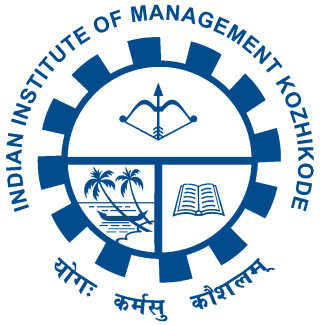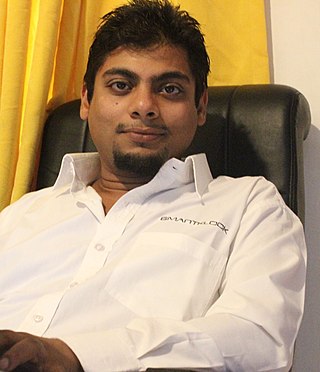A startup or start-up is a company or project undertaken by an entrepreneur to seek, develop, and validate a scalable business model. While entrepreneurship includes all new businesses including self-employment and businesses that do not intend to go public, startups are new businesses that intend to grow large beyond the solo-founder. During the beginning, startups face high uncertainty and have high rates of failure, but a minority of them do go on to become successful and influential.
National Association of Software and Service Companies (NASSCOM) is an Indian non-governmental trade association and advocacy group that primarily serves the Indian technology industry. Founded in 1988, NASSCOM operates as a nonprofit organization and serves as a key entity within the Indian technology sector.

The Goa Institute of Management is an Indian autonomous business school located North Goa district in the state of Goa. GIM Goa was founded in 1993 by Romuald D'Souza, a Jesuit priest.
A business incubator is an organization that helps startup companies and individual entrepreneurs to develop their businesses by providing a fullscale range of services, starting with management training and office space, and ending with venture capital financing. The National Business Incubation Association (NBIA) defines business incubators as a catalyst tool for either regional or national economic development. NBIA categorizes its members' incubators by the following five incubator types: academic institutions; non-profit development corporations; for-profit property development ventures; venture capital firms, and a combination of the above.

Indian Institute of Management Kozhikode is an autonomous public business school located in Calicut (Kozhikode), Kerala. The institute, set up in 1996 by the Government of India in collaboration with the State Government of Kerala, is one of the 20 Indian Institutes of Management (IIMs). It was the fifth IIM to be established.

Software Technology Parks of India (STPI) is an S&T autonomous society under Ministry of Electronics and Information Technology (MeitY) engaged in promoting IT/ ITES Industry, Innovation, R&D, Start-ups, Product/ IP creation in the field of emerging technologies like Internet of Things (IoT), Blockchain, Artificial Intelligence (AI), Machine Learning (ML), Computer Vision, Robotics, Augmented & Virtual Reality, Animation & Visual effect (AVGC), Data Science & Analytics for various domains like FinTech, Agritech, MedTech, Autonomous Connected Electric & Shared(ACES) Mobility, ESDM, Cyber Security, Gaming, Industry 4.0, Drone, Efficiency Augmentation, etc. STPI was established in 1991 by the Indian Ministry of Electronics and Information Technology (MeitY) with the objective of encouraging, promoting and boosting the export of software from India. STPI Headquarters is located in New Delhi with over 60+ Centres spread across the country.
Ashok Jhunjhunwala is an Indian academic and innovator. He received his B.Tech. from the Indian Institute of Technology, Kanpur and PhD from the University of Maine. He has been a faculty member at the Indian Institute of Technology Madras since 1981. He is the President of IIT Madras Research Park and Chairman of International Institute of Information Technology, Hyderabad. During his career, he has contributed extensively to technology innovation and adoption in the Indian context.
Flipkart Private Limited is an Indian e-commerce company, headquartered in Bangalore, and incorporated in Singapore as a private limited company. The company initially focused on online book sales before expanding into other product categories such as consumer electronics, fashion, home essentials, groceries, and lifestyle products.
Zomato is an Indian multinational restaurant aggregator and food delivery company. It was founded by Deepinder Goyal and Pankaj Chaddah in 2008. Zomato provides information, menus and user-reviews of restaurants as well as food delivery options from partner restaurants in more than 1,000 Indian cities and towns, as of 2022–23. Zomato rivals Swiggy in food delivery and hyperlocal space.
Harvard Innovation Labs (i-Lab) is an institution which aims to promote team-based and entrepreneurial activities among Harvard students, faculty, entrepreneurs, and members of the Allston and Greater Boston communities.

The Entrepreneurship Cell, IIT Bombay, also known as E-Cell, IIT Bombay, is the primary entrepreneurship promoting body of the Indian Institute of Technology Bombay, managed and run completely by the students of the institute. It organizes initiatives like the annual business plan competition Eureka! and the flagship event, The Entrepreneurship Summit (E-Summit) in January each year, which receives a footfall of over 30,000 people who include students, investors, corporates, mentors, celebrities and the most important; Entrepreneurs.

redBus is an Indian online bus ticket booking company that provides bus ticket booking through its website and iOS and Android mobile apps. It is headquartered in Bangalore and works like a hub, acting as a medium for a network of more than 3500 bus operators, across the countries of India, Malaysia, Indonesia, Singapore, Peru, and Colombia. It claims to have registered over 180 million trips, with a customer base of over 20 million. In 2018, the company achieved a GMV of ₹50 billion, with a 70% share in the Indian online bus ticketing segment.

Kerala Startup Mission is the central agency of the Government of Kerala for entrepreneurship development and incubation activities in Kerala, India. KSUM was primarily founded to undertake the planning, establishment, and management of the technology business incubator (TBI), a startup accelerator in Kerala, to promote technology-based entrepreneurship activities, and to create the infrastructure and environment required to support high-technology-based businesses.

Jason Fernandes is an Indian blockchain entrepreneur and technology columnist hailing from Goa. As a teenager, Fernandes founded the internet portal ZeoCities.com, the non-profit LDKids.org and wrote for CHIP Magazine. Later, while studying at the University of Texas, Austin, Fernandes co-invented the Internet-based DVR, InstantTV, and was part of the founding team at PerceptiveI. After moving to Goa in 2012, Fernandes began working as a monthly technology columnist for GlobeAsia Magazine, Indonesia. He has also founded the IoT company SmartKlock Inc and two Blockchain companies, FUNL Corp, and Malta-based AET Ventures (AEToken), of which he is presently the COO. Fernandes has advised state governments and political parties on IT and education policies. He also writes for various technology media publications and has spoken at TEDx events.

Marwadi University (MU) is a private university located in Rajkot, Gujarat, India. It was established on 9 May 2016 by the Marwadi Education Foundation through The Gujarat Private Universities (Amendment) Act, 2016. As of 2017, it offers 54 different courses. It is graded A+ by NAAC.
Policybazaar is an Indian insurance aggregator and multinational financial technology company based in Gurgaon. The company was founded in June 2008 by Yashish Dahiya, Alok Bansal and Avaneesh Nirjar. It provides a digital platform—website and an app—where users can compare insurance policies and other financial services from major insurance companies. The company is India's largest insurance aggregator, and has expanded its operations to the United Arab Emirates.

Don Bosco College of Engineering is an institute of technical education in Fatorda, Goa. It was established in 2011, and is run by the Fatorda Salesian Society. The college campus was designed by civil engineer Olavo Carvalho.

The Government e Marketplace (GeM) is an online platform for public procurement in India. The initiative was launched on August 9, 2016, by the Ministry of Commerce and Industry, Government of India with the objective to create an open and transparent procurement platform for government buyers. It was built in a record time of 5 months to facilitate the online procurement of goods and Services. The purchases through GeM by Government users have been authorized and made mandatory by the Ministry of Finance by adding a new Rule No. 149 in the General Financial Rules, 2017.
Yulu is an Indian technology-driven electric micromobility platform headquartered in Bengaluru.It provides shared low-speed two-wheeler electric vehicle (EV) services in Bengaluru, Mumbai, Navi Mumbai, Delhi and Gurugram. Yulu operates 25,000 dockless shared EVs and has four million users. Its EVs are used for 280,000 last-mile deliveries and 10,000 commutes each day.

CIIE.CO is an Indian startup accelerator and incubator that supports early-stage startups located at IIM Ahmedabad in Ahmedabad, India. It was founded in 2002 to promote innovation and entrepreneurship in India. It is a Center of excellence set up at Indian Institute of Management Ahmedabad with support from the Government of India's Department of Science and Technology and the Government of Gujarat.












